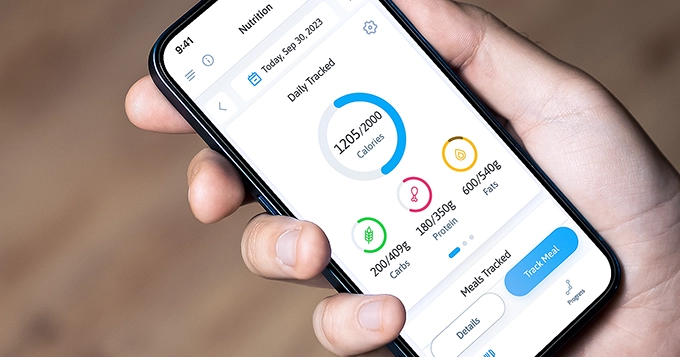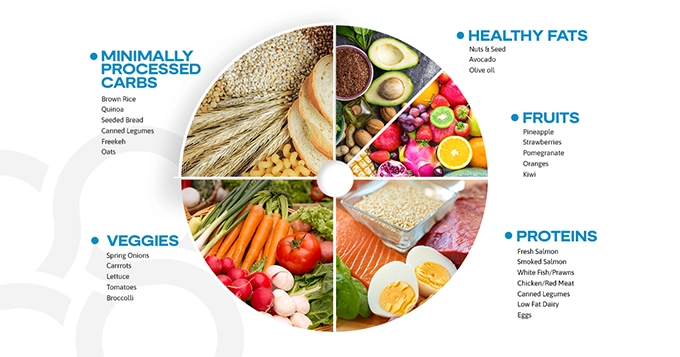When a calorie-deficit diet fails to accomplish your desired outcomes, losing weight becomes more challenging. If your weight loss has slowed or you are gaining weight despite being in a calorie deficit, try these 4 tips to help you get back on track.
Tip 1: Re-evaluate your calorie intake.
Knowing how to be in a calorie deficit is one of the key factors in achieving weight loss.
You probably stumbled upon this article because you searched for “my calorie deficit.” You’re in luck because our tip #1 is all about re-evaluating your calorie intake.
Always make sure you are not eating more calories than you think. A 500-calorie deficit per day is often recommended. If you believe you are in a calorie deficit but not losing weight despite your efforts, you are probably not. Check your calorie intake and expenditure twice or three times because there is probably a mistake somewhere making you eat more or burn fewer calories than you think.
Again, things like this occur frequently. Yes, even to people who swear they never make a mistake like this because they meticulously track everything from eating in a calorie deficit to the last gram. Working with a licensed nutritionist or your doctor to figure out the best caloric range to help you reach your goals is recommended.
Download the Trainest app to help you track your calories better.
Tip 2: Adjust your macro-nutrient ratios.
Sometimes, switching up the ratio of carbohydrates, proteins, and fats can help jump-start your weight loss.
Carbohydrates, fats, and proteins are macronutrients your body needs for normal growth and development. Even though your diet’s macronutrient composition may not directly affect weight loss, it may hinder your ability to stick to a calorie-deficit diet. Tailor your macronutrient proportion based on your preferences and well-being to improve your chances of success on a low-calorie diet.
However, not everyone is suitable for a diet that emphasizes a high intake of one macronutrient (such as fat) and a low intake of another (such as carbohydrates). Instead, you might be able to stick to a balanced macronutrient diet, which can also help you in a calorie deficit to lose fat.
The acceptable macronutrient distribution ranges (AMDR) are between 45 and 65 percent carbs, 20 to 35 percent fats, and 10 to 35 percent protein. Eating more protein aids with weight loss. If you can get enough protein from food to meet your needs, protein shakes may not be necessary.
Tip 3: Increase your activity level.
Even small increases in levels of physical activity can have a substantial impact on weight loss. When you are in a calorie deficit not losing weight, one strategy is to eat less, but exercise should also be a part of the plan.
Exercise can help in various ways, not least of which is that it allows you to retain muscle while losing weight. At rest, lean muscle burns more calories than fat, so if you cut calories too drastically and don’t exercise, your body may start burning muscle to meet its basic needs. This can further slow your metabolism. If possible, a person who is not physically active should try to increase their daily activity levels.
This could include walking, taking the stairs rather than the elevator, hiking, or engaging in a leisure activity like biking. Joining group fitness classes, walking at least 10,000 steps per day, and participating in strength and cardio workouts a few times per week are all ways to incorporate more movement and exercise.
Start with 150 minutes of moderate exercise per week, such as dancing or biking. With 30 minutes per day, five days per week, you could reach your 150-minute weekly goal. The amount of physical activity needed for weight management varies substantially among people. To lose or maintain a healthy weight, you may need to exert more effort and be more active than others.
Tip 4: Take a break.
Sometimes, your body just needs a break from the stress of dieting.
Sleep and stress levels are commonly disregarded when dealing with health and weight. Both are crucial to the proper functioning of your hormones and body.
Stress and a lack of sleep can alter important metabolic hormones like ghrelin, leptin, and cortisol. Cortisol levels can rise as a result of excessive stress, which is known to increase belly fat accumulation and increase the risk of chronic diseases like type II diabetes and heart disease. Controlling these hormones ought to reduce appetite and unnatural cravings.
Sleeping for 7-9 hours per night and avoiding stress can improve the function of these key hormones.
Conclusion
A daily calorie deficit of 500 calories is normally recommended to achieve a weekly weight loss of one pound. And exercising more and tracking your calories may assist you in establishing a calorie deficit. A calorie deficit may be easier to achieve if you include more protein in your diet because it may make you feel fuller for longer. Getting enough quality sleep and avoiding stressors also reduces your calorie consumption.
If you’re not losing weight on a calorie-deficit diet, don’t give up. Try these weight loss tips to help you get back on track and reach your goals.









